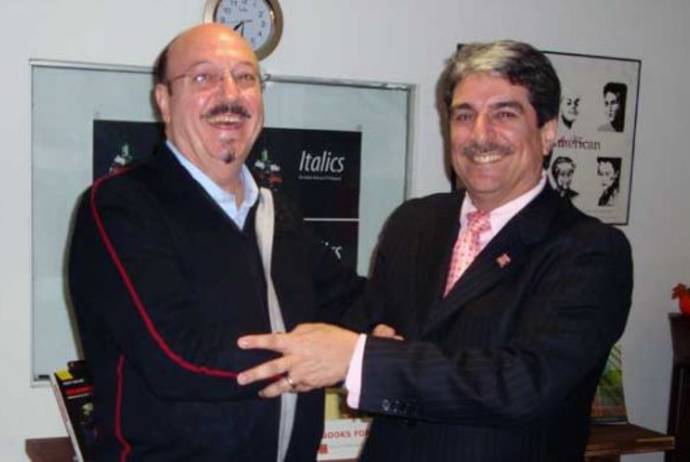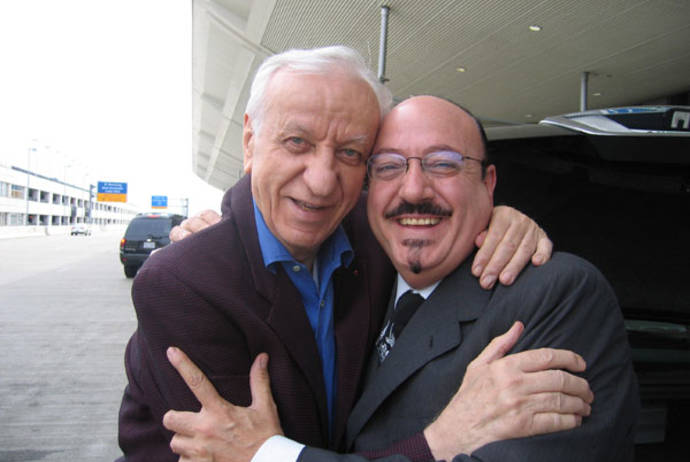“Rieccolo!” diceva di Fanfani il grande giornalista Indro Montanelli. Ed io sarei tentato di pensare che Claudio Bozzo sia sulle orme di uno dei più grandi protagonisti della storia contemporanea d’Italia. Era solo il Giugno 2008 quando intervistai il più giovane presidente che la Mediterranean Shipping Co. (MSC) avesse mai nominato in Nord America. E scrivevo pure che Gianluigi Aponte, Presidente della MSC sfidava il futuro. Aponte tuttavia aveva elementi imprenditoriali per lanciare Claudio Bozzo, mentre è sorprendente trovare oggi Claudio alla testa dell’Italy-America Chamber of Commerce (IACC) che nei suoi 132 anni di esistenza, non ha brillato per la promozione di giovani talenti alla sua guida. Per questo il merito di Claudio “Bolt” Bozzo aquista piu’ valore: brucia le tappe di una fantastica corsa come Usain Bolt brucia tutti i suoi avversari sui 100 metri. E anche lui, come Bolt, lo fa con la naturalezza di chi sa di essere dotato e non se ne vanta. Appena arrivo nel suo ufficio su Fifth Ave. e 37th St. si preoccupa subito che io mi senta a mio agio mentre gli faccio la prima domanda.
Tu sei il primo presidente giovane dopo la breve parentesi di Paolo Torello. Credi che anche l’Italia stia finalmente cercando soluzioni nelle nuove generazioni di dirigenti?
Innanzitutto ringrazio Paolo Torello che ha aperto questo, come tu lo definisci, “nuovo trend”. Per quanto mi riguarda, mi auspico che i meriti derivino sempre dalla competenza piuttosto che dall’età. Sarebbe bello che tutti avessero a 40 anni le capacità e la diplomazia di chi ne ha già 60. Anche se oggi dobbiamo ammettere che il vecchio proverbio “Esperienza maestra di vita” sarebbe più attuale se scritto “Google maestro di vita”. La tecnologia sta infatti accelerando i cicli di vita: si comincia prima e il ciclo lavorativo è molto più veloce. Mi spiego: se è vero che è possibile raggiungere posizioni di responsabilità più velocemente di quanto non si potesse prima dell’avvento di internet, è anche vero che il turnover è molto più serrato.
Ho cominciato a portare qualche piccola novità nella IACC: principalmente qualche leggero aggiustamento nel CdA, che credo caratterizzi sempre la filosofia di un’azienda. Inoltre abbiamo creato gruppi dedicati a giovani e donne all’interno dello IACC. La presenza di questi gruppi è un atto dovuto nel XXI secolo. Abbiamo poi cercato di responsabilizzare maggiormente i nostri dipendenti, in modo tale da evitare di cadere nel qualunquismo. In pratica stiamo cercando di lavorare su una tradizione solida portando la competenza che ci permetterà di ritrovarci nello stesso ufficio tra 3 anni.
Insomma se dovessimo pensare ad un nuovo paradigma operativo nello IACC, di che cosa dovremmo parlare?
Se non ti dispiace io rispondo da Genovese: “Fare di più con meno”. Alla base della mia vita, e spero alla base di tutti coloro che lavorano, c’e’ la passione. Io amo l’Italia e considero lo IACC una grande opportunità per fare del bene al mio Paese. da quando il sistema economico mondiale si sta rigenerando stiamo tutti cercando formule nuove per avere successo. Noi siamo qui per spendere bene i fondi stanziati per la promozione dell’Italia. Siamo qui per fornire in maniera veloce ed efficiente agli imprenditori Italiani i necessari contatti di mercato e per generare sinergie produttive e un dialogo continuo con gli investitori, nella speranza di avere i loro feedback: vorremmo essere informati di quando facciamo male e di quando facciamo bene, in modo tale da migliorarci continuamente. Quello che ti posso assicurare è che questa sfida avviene sotto riflettori antichi che per 132 anni hanno illuminato la storia dell’Italia imprenditoriale negli USA e io posso solo considerarmi fortunato se oggi posso misurarmi con questa nobile missione.
Il Ministro Tremonti ha sottolineato, all’ultimo Meeting dell’Amicizia di Rimini, che l’Italia e’ formata per l’80% di aziende piccole e medie. Se l’imprenditoria Italiana non fa sinergia, rischia di rimanere fuori dai mercati più grandi. Cosa ha intenzione di fare nel caso specifico la IACC?
La IACC e’, per definizione, un’ente che promuove il commercio dell’Italia nelle sedi dove si trova ad operare, in armonia con gli Enti governativi locali. Detto questo, appare evidente che noi abbiamo il dovere di aiutare chiunque ci consulta dall’Italia così da metterlo in condizione di ottenere profitto in loco. La più grande virtù dell’Italia è la diversificazione dei propri. Si potrebbe osservare che questa diversificazione è anche l’oggetto, che tu mi dici, del richiamo del nostro Ministro. A lume di logica posso solo confermare quello che tutti gli imprenditori stanno cercando di fare per affrontare i grandi mercati emergenti del XXI secolo: più sinergia e più aggregazione. Questo comunque è al di là della sfera di influenza dello IACC. Negli USA ci sono delle nicchie di mercato dove l’imprenditoria Italiana ha creato delle vere e proprie roccaforti grazie a marchi che solo 10 anni fa nemmeno esistevano. Tu mi insegni che l’imprenditore mette l’anima nel proprio prodotto e sogna sempre, quale che sia il segmento commerciale dove opera, che un giorno tutto il mondo possa comprendere la sua intuizione. È difficile andargli a dire di fare sinergia con un suo concorrente.
C’è ovviamente chi spende più o meno bene i propri soldi per la promozione dei propri prodotti. La mia natura mi porta a guardare il risultato finale e, anche nelle difficoltà obiettive di questa congiuntura economica, dovunque io vado, trovo una simpatia per l’Italia che mi rende orgoglioso di essere oggi nella posizione di poter essere d’aiuto per il mio Paese.
La perdita di posizioni di privilegio e’ un costo che tutto il mondo occidentale sta pagando. Io sono convinto che l’Italia sia più agile di altri paesi e pronta a ricominciare la corsa verso lo scudetto…. A proposito oggi gioca l’Italia con la Serbia, sai mica il risultato?
Hanno sospeso la partita per disordini nella tua Genova…
Tu scherzi?... E cosi dicendo Claudio gira gli occhi verso il computer, va sulla pagina del suo quotidiano Italiano poi mi guarda e dice: “Ma non ci credo…qui stiamo impazzendo!”
Riprendiamo il nostro discorso: ILICA cerca di portare il messaggio di sinergia nella promozione culturale dell’Italia, come valore aggiunto. Tu sei nel CdA di ILICA, cosa significa questo per la IACC?
Io credo che sia un fatto positivo far avvicinare tutti i movimenti nuovi alla Camera. Prima ancora di pensare a far fare sinergie alle imprese, credo sia necessario fare sinergia tra i gruppi che si propongono per la promozione dell’Italia negli Stati Uniti. Ilica nasce come Fondazione per la promozione della lingua e della cultura Italiana e io credo che specialmente in questa riorganizzazione globale, conoscere meglio la lingua di una cultura sia definitivamente il valore aggiunto alla promozione commerciale della stessa. Lo scopo dello IACC è stato promuovere il dialogo culturale tra le due sponde dell’Atlantico per 130 anni, e sono orgoglioso di continuare questa tradizione. Nel secolo scorso ciò era forse più facile, poiché i parametri di scambio erano più favorevoli: dollaro forte, America più ricca e lira debole in un’Italia che voleva diventare prosperosa. Oggi dobbiamo cercare nuove sinergie perché i parametri si sono invertiti, ma l’Italia continua ad essere di moda in America. Uno degli elementi che vivo giornalmente è la promozione dell’Italian Style che facciamo sulle nostre navi all’MSC. Il nostro modo di lavorare, il nostro modo di relazionarci con i nostri clienti e tutto quello che e’ Italiano e’ancora magico…
Vorrei chiudere questo articolo con una considerazione personale. La prima volta che intervistai Claudio mi disse che era un uomo fortunato per tutto quello che la vita gli aveva regalato. Oggi quel ragazzo è diventato un uomo cauto, giustamente sospettoso e sempre con i piedi per terra. Ebbene, se la fortuna aiuta gli audaci, io penso che la nostra comunità abbia trovato un nuovo leader che tutti noi dovremmo sostenere per i suoi giudizi misurati, la sua volontà di fare bene e la sua motivazione: l’amore per l’Italia. Claudio Bozzo può far molto per l’Italia in America e viceversa. La IACC ha trovato un presidente moderno e noi possiamo solo augurargli: “In bocca al lupo!”.

































 know very little about our own culture otherwise we would be more circumspect. Tony Lo Bianco once said to his detractors, who complained that he only accepted “Mafioso” roles, that unless we could offer cultural/financial support we would have to accept roles decided by those who pay us. We Italians don’t even have a commercial publishing house (except for Bordighera Press) and we cannot address this issue synergistically. We at the Calandra Institute organized a symposium two months ago where we discussed the problems of the 21st century. I agree with you in that if we continue to speak solely of our past that we will not be able to establish our future. Tragic as the events were, the Jews have had the Holocaust, the African Americans have had slavery and the Hispanics have their language as a common denominator. We are in great difficulty because although Italy seems to be disconnected from its communities here in the States, we must still transmit our current status to Italy. For example, in 1991, Fred Gardaphè, Paolo Giordano, and I edited “From the Margins”. People would ask us how they could “get a copy” our book rather than where they could purchase it. It was difficult for us to explain that the book had to be ordered in a bookstore and purchased because, as we would sometimes respond sarcastically, “Culture doesn’t fall of a truck”. I might add that with all of the money that our leaders have, they should at least inform themselves about the reality of a culture which they intend to represent. I would only propose to hold a big conference on neutral territory. We should try to gather all of the major foundations, perhaps at the Italian Embassy, to discuss how we can better serve this great culture that we have in common.
know very little about our own culture otherwise we would be more circumspect. Tony Lo Bianco once said to his detractors, who complained that he only accepted “Mafioso” roles, that unless we could offer cultural/financial support we would have to accept roles decided by those who pay us. We Italians don’t even have a commercial publishing house (except for Bordighera Press) and we cannot address this issue synergistically. We at the Calandra Institute organized a symposium two months ago where we discussed the problems of the 21st century. I agree with you in that if we continue to speak solely of our past that we will not be able to establish our future. Tragic as the events were, the Jews have had the Holocaust, the African Americans have had slavery and the Hispanics have their language as a common denominator. We are in great difficulty because although Italy seems to be disconnected from its communities here in the States, we must still transmit our current status to Italy. For example, in 1991, Fred Gardaphè, Paolo Giordano, and I edited “From the Margins”. People would ask us how they could “get a copy” our book rather than where they could purchase it. It was difficult for us to explain that the book had to be ordered in a bookstore and purchased because, as we would sometimes respond sarcastically, “Culture doesn’t fall of a truck”. I might add that with all of the money that our leaders have, they should at least inform themselves about the reality of a culture which they intend to represent. I would only propose to hold a big conference on neutral territory. We should try to gather all of the major foundations, perhaps at the Italian Embassy, to discuss how we can better serve this great culture that we have in common.

